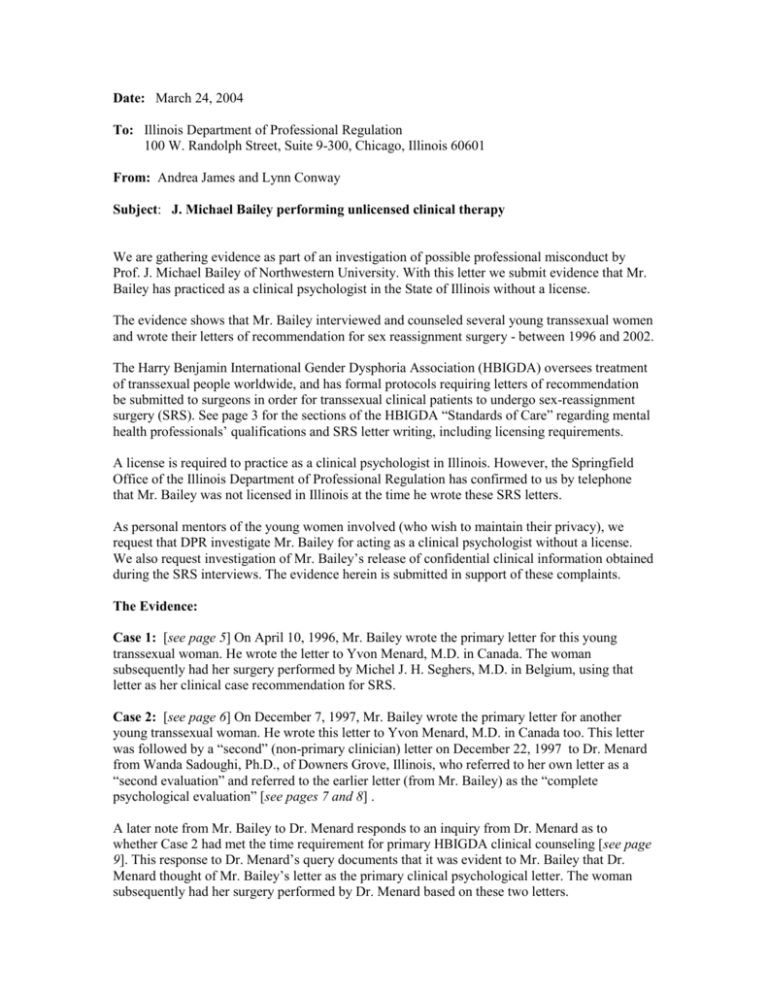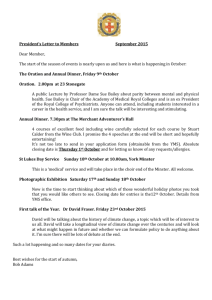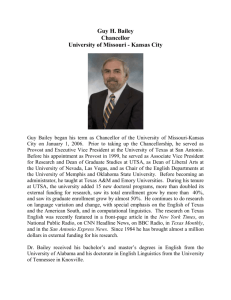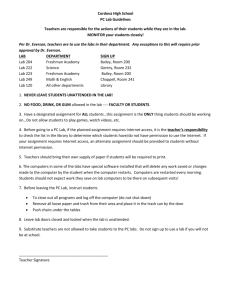J. Michael Bailey performing unlicensed clinical therapy
advertisement

Date: March 24, 2004 To: Illinois Department of Professional Regulation 100 W. Randolph Street, Suite 9-300, Chicago, Illinois 60601 From: Andrea James and Lynn Conway Subject: J. Michael Bailey performing unlicensed clinical therapy We are gathering evidence as part of an investigation of possible professional misconduct by Prof. J. Michael Bailey of Northwestern University. With this letter we submit evidence that Mr. Bailey has practiced as a clinical psychologist in the State of Illinois without a license. The evidence shows that Mr. Bailey interviewed and counseled several young transsexual women and wrote their letters of recommendation for sex reassignment surgery - between 1996 and 2002. The Harry Benjamin International Gender Dysphoria Association (HBIGDA) oversees treatment of transsexual people worldwide, and has formal protocols requiring letters of recommendation be submitted to surgeons in order for transsexual clinical patients to undergo sex-reassignment surgery (SRS). See page 3 for the sections of the HBIGDA “Standards of Care” regarding mental health professionals’ qualifications and SRS letter writing, including licensing requirements. A license is required to practice as a clinical psychologist in Illinois. However, the Springfield Office of the Illinois Department of Professional Regulation has confirmed to us by telephone that Mr. Bailey was not licensed in Illinois at the time he wrote these SRS letters. As personal mentors of the young women involved (who wish to maintain their privacy), we request that DPR investigate Mr. Bailey for acting as a clinical psychologist without a license. We also request investigation of Mr. Bailey’s release of confidential clinical information obtained during the SRS interviews. The evidence herein is submitted in support of these complaints. The Evidence: Case 1: [see page 5] On April 10, 1996, Mr. Bailey wrote the primary letter for this young transsexual woman. He wrote the letter to Yvon Menard, M.D. in Canada. The woman subsequently had her surgery performed by Michel J. H. Seghers, M.D. in Belgium, using that letter as her clinical case recommendation for SRS. Case 2: [see page 6] On December 7, 1997, Mr. Bailey wrote the primary letter for another young transsexual woman. He wrote this letter to Yvon Menard, M.D. in Canada too. This letter was followed by a “second” (non-primary clinician) letter on December 22, 1997 to Dr. Menard from Wanda Sadoughi, Ph.D., of Downers Grove, Illinois, who referred to her own letter as a “second evaluation” and referred to the earlier letter (from Mr. Bailey) as the “complete psychological evaluation” [see pages 7 and 8] . A later note from Mr. Bailey to Dr. Menard responds to an inquiry from Dr. Menard as to whether Case 2 had met the time requirement for primary HBIGDA clinical counseling [see page 9]. This response to Dr. Menard’s query documents that it was evident to Mr. Bailey that Dr. Menard thought of Mr. Bailey’s letter as the primary clinical psychological letter. The woman subsequently had her surgery performed by Dr. Menard based on these two letters. 2 Case 3: [see page 10] On December 19, 2002, Mr. Bailey wrote the secondary letter for another young transsexual woman. He wrote this letter to Toby Meltzer, M.D., and the young woman subsequently had her SRS performed by Dr. Meltzer. It is clear that Mr. Bailey held himself out to these clients and practitioners as rendering clinical psychological services, and that this may not have been for money, but for “other consideration,” namely for acquiring case history information that he revealed (without permissions) in a book published in 2003, or for sex, as alleged by one woman who states she received an “approval letter” and later performed a sexual favor for Mr. Bailey. Please note that the young transsexual women who have come forward to provide these SRS letters wish their public identities to remain anonymous at the present time. Nevertheless, they are willing to be interviewed in confidence by State investigators, so as to report in person about their interactions with Mr. Bailey and otherwise assist in the DPR investigation. We can be reached for follow-up at the e-mail addresses and phone numbers below. Ms. Conway can also coordinate local Chicago interactions between the young women and your investigators by arranging confidential meetings, phone calls and other interactions amongst them. We are in the process of uncovering and interviewing more of Mr. Bailey’s clinical clients during the period from 1996 to 2002, and expect to submit additional evidence in the future. Sincerely, Ms. Andrea James Owner, tsroadmap.com Hollywood, California http://www.tsroadmap.com andrea AT tsroadmap.com XXX-XXX-XXXX Ms. Lynn Conway Professor of Electrical Engineering and Computer Science, Emerita University of Michigan, Ann Arbor, Michigan http://www.lynnconway.com lynn AT ieee.org XXX-XXX-XXXX 3 Relevant sections of the HBIGDA Standards of Care regarding clinical competence and training for trangender care and re SRS letter writing. IV. The Mental Health Professional The Ten Tasks of the Mental Health Professional. Mental health professionals (MHPs) who work with individuals with gender identity disorders may be regularly called upon to carry out many of these responsibilities: 1. To accurately diagnose the individual's gender disorder; 2. To accurately diagnose any co-morbid psychiatric conditions and see to their appropriate treatment; 3. To counsel the individual about the range of treatment options and their implications; 4. To engage in psychotherapy; 5. To ascertain eligibility and readiness for hormone and surgical therapy; 6. To make formal recommendations to medical and surgical colleagues; 7. To document their patient's relevant history in a letter of recommendation; 8. To be a colleague on a team of professionals with an interest in the gender identity disorders; 9. To educate family members, employers, and institutions about gender identity disorders; 10. To be available for follow-up of previously seen gender patients. The Adult-Specialist. The education of the mental health professional who specializes in adult gender identity disorders rests upon basic general clinical competence in diagnosis and treatment of mental or emotional disorders. Clinical training may occur within any formally credentialing discipline -- for example, psychology, psychiatry, social work, counseling, or nursing. The following are the recommended minimal credentials for special competence with the gender identity disorders: 11. A master's degree or its equivalent in a clinical behavioral science field. This or a more advanced degree should be granted by an institution accredited by a recognized national or regional accrediting board. The mental health professional should have documented credentials from a proper training facility and a licensing board. 12. Specialized training and competence in the assessment of the DSMIV/ICD-10 Sexual Disorders (not simply gender identity disorders). 13. Documented supervised training and competence in psychotherapy. 14. Continuing education in the treatment of gender identity disorders, which may include attendance at professional meetings, workshops, or seminars or participating in research related to gender identity issues. 4 . . Two Letters are Generally Required for Genital Surgery. Genital surgery for biologic males may include orchiectomy, penectomy, clitoroplasty, labiaplasty or creation of a neovagina; for biologic females it may include hysterectomy, salpingo-oophorectomy, vaginectomy, metoidioplasty, scrotoplasty, urethroplasty, placement of testicular prostheses, or creation of a neophallus. It is ideal if mental health professionals conduct their tasks and periodically report on these processes as part of a team of other mental health professionals and nonpsychiatric physicians. One letter to the physician performing genital surgery will generally suffice as long as two mental health professionals sign it. More commonly, however, letters of recommendation are from mental health professionals who work alone without colleagues experienced with gender identity disorders. Because professionals working independently may not have the benefit of ongoing professional consultation on gender cases, two letters of recommendation are required prior to initiating genital surgery. If the first letter is from a person with a master's degree, the second letter should be from a psychiatrist or a Ph.D. clinical psychologist, who can be expected to adequately evaluate co-morbid psychiatric conditions. If the first letter is from the patient's psychotherapist, the second letter should be from a person who has only played an evaluative role for the patient. Each letter, however, is expected to cover the same topics. At least one of the letters should be an extensive report. The second letter writer, having read the first letter, may choose to offer a briefer summary and an agreement with the recommendation. . . Source: The Harry Benjamin International Gender Dysphoria Association's Standards of Care for Gender Identity Disorders, Sixth Version February, 2001 http://www.hbigda.org/socv6.html 5 Case 1: 6 Case 2: 7 Case 2 (cont.): 8 Case 2 (cont.): 9 Case 2 (cont.): 10 Case 3:








